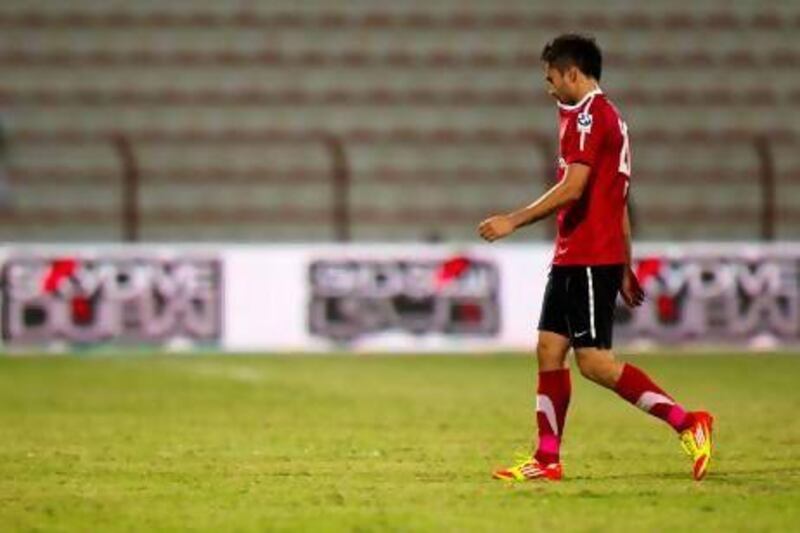Last December, as Rio Ferdinand celebrated Robin van Persie's late winner in the Manchester derby at the Etihad Stadium, a coin thrown from the stands left the Manchester United defender with a deep gash above his left eye.
Moments later, a Manchester City fan raced on to the pitch to confront Ferdinand, but was held back by the home goalkeeper Joe Hart. United's Wayne Rooney was also pelted with missiles thrown from the stands while waiting to take corners.
Later, the pitch invader was fined, along with a number of other fans, for their behaviour in that game, by the city's court.
He was also given a suspended jail sentence and banned from attending matches for three years. City, however, were not forced to play their next two matches at neutral venues, without their fans in attendance. Nor was the game abandoned.
In April last year, Mike Dean, the referee, stopped the Premier League game between Queens Park Rangers and Arsenal for two minutes after his assistant was hit by a coin thrown by a QPR fan.
The fan was later banned for life, but again, the match was neither abandoned nor were QPR forced to play behind closed doors.
Similar incidents have taken place across the globe, but league officials and disciplinary committees have generally avoided collective punishments on clubs and fans, reserving such sentences for the most extreme cases.
Quique Sanchez Flores's "surprise" and exasperation, then, over the Football Association's Disciplinary Committee's decision to force his Al Ahli side to play two of their home matches at neutral venues, without home fans in attendance, is understandable.
"This is really strange," the Spaniard said after the first of those two games, played at Al Shabab on Saturday against Al Wahda. "I don't like this, the players don't like it. To play like this is very difficult. We play to enjoy and we play to bring joy to our fans."
Branko Ivankovic, the Wahda coach, had similar thoughts and said: "This is something that is not natural in football. We are playing football for the fans and trying to put up a show for them. But OK, sometimes things happen and the teams are forced to play without spectators. I hope we will not see a repeat of the events that happened during the match between Ahli and Al Ain."
Nobody with an iota of passion for UAE football would like to see a repeat of that incident.
To recount, a spectator, sitting among Ahli fans, threw a heavy item at the linesman Mohammed Al Mehairi, leaving him with a bloody head that required stitches later.
The incident, which took place in added time with scores 0-0, prompted the referee Hamad Al Sheikh to abandon the game.
Officials do not deserve such rogue behaviour and Al Sheikh was within his rights to abandon the match. But with only a couple of minutes to go, he could have, perhaps, been a bit more generous and allowed the game to finish, given its importance in the Pro League title race.
Back in 2011, during an ill-tempered Romanian Liga 1 game between Petrolul Ploiesti and Steaua Bucharest, a Petrolul fan ran onto the pitch and hit the Steaua defender George Galamaz in the face with a heavy object, breaking his cheekbone.
Two Steaua players, Novak Martinovic and Razvan Stanca, attacked the fan and they were shown red cards by the referee and the match continued after a 30-minute halt.
However, the officials were forced to abandon the game after Petrolul fans started throwing flares and firecrackers onto the ground, one of which hit and injured the Steaua goalkeeper.
Al Sheikh could have shown similar persistence and the Disciplinary Committee could have waited for the police to finish their investigation before making a decision.
They did not and it later turned out the offending fan, Rashid Al Suwaidi, plays for the Wahda Under 15 team.
Al Suwaidi has since visited both Al Mehairi and Ahli to apologise for the incident, but the damage has already been done. Sanchez Flores's team have been sanctioned for the actions of an individual, who may not be an Ahli fan.
The episode, however, presents an opportunity to ring in some changes. Banning fans of one team cannot be an insurance against such incidents. How can you be sure no Ahli supporters attended the last game, entering the stadium as Wahda fans?
Salem Al Amri, the chairman of the Disciplinary Committee, has suggested installing surveillance cameras to monitor the fans and making identity cards mandatory for attending matches. The new Turkish Football Federation laws on crowd violence could be worth emulating as well.
According to those rules, male fans, over the age of 12, will be barred from attending matches of the sanctioned teams, but women and children under the age of 12 will be allowed in free. The first game under the new rule, between Fenerbahce and Manisaspor in 2011, attracted more than 41,000 women and children.
With the Pro League in desperate need of fans, the Turkish model could be the way forward. Playing in empty stadiums helps no one.
Follow us
[ @SprtNationalUAE ]





